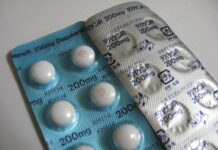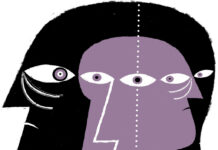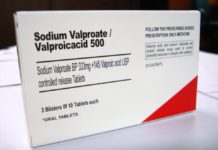Childhood Bipolar Disorder, Deconstructed
Diagnosing children with juvenile or pediatric bipolar disorder is largely an American phenomenon. Do we actually have more “bipolar” children in the United States—or are we simply labeling more of them as such? If it is ever fair to call a child “manic,” isn’t the child’s environment the direction in which we should look?
I Want Change
Only two hours after we got home, Dan fearlessly told me of the suicide plan that he'd devised while in the hospital. He had all that time to think about it while nobody was listening. He'd lost his dignity, his identity and his place in society. He had lost the will to live.
Antidepressant-Induced Mania
It is generally recognized in antipsychiatry circles that antidepressant drugs induce manic or hypomanic episodes in some of the individuals who take them. Psychiatry's usual response to this is to assert that the individual must have had an underlying latent bipolar disorder that has "emerged" in response to the improvement in mood. The problem with such a notion is that it is fundamentally unverifiable.
Can Children Have Bipolar Disorder?
After seeing the family for two sessions I came to the conclusion that what Adam was suffering from was inconsistent discipline, temper tantrums and misbehavior that were inadvertently encouraged by his parents. The correct prescription for Adam was not an antipsychotic medication that might cause him harm, but family therapy to help the parents implement a behavioral program that would fit Adam’s needs.
Study Suggests Mania More Common in Psychosis When Antidepressants Used
A prospective cohort study of those labeled high risk for psychosis finds a higher prevalence of antidepressant use among those who develop manic symptoms.
Anticonvulsant Implicated in Birth Defects in up to 4,100 Children, French Study Finds
Between 2,150 and 4,100 children suffered from severe malformations connected to valproate prescription.
Searching for Zen and Finding a Cow
If I had a clinical problem, why was something as ancient and simple as meditation helping me? And if normal positive human habits could be so profoundly useful, why the heck was the field marketing pills and “clinical” coping mechanisms to me instead? This frustration helped me jump ship from the medical mindset and hop into the world of humanity.
Study Explores Sexual and Intimate Partner Violence in College Women with Disabilities
A new study explores sexual violence and intimate partner violence in college women with mental health related disabilities.
Study Connects Environmental Risk Factors and Psychosis
A meta-analysis of known risk factors for psychosis finds elevated risk with the presence of childhood trauma, adverse life events, and affective dysfunction.
Reflections on a Pathologized Adolescence and a Vision for the Future
My heart envisions a future of grassroots community-based, free, accessible, welcoming, non-judgmental and safe spaces for young people in the middle of the hurricane of adolescence....They will be spaces facilitated by those of us who’ve reclaimed what it means to be human.
Bright Light Therapy More Effective Than Medication Alone for Bipolar Depression
A new randomized, double-blind, placebo-controlled trial has found bright light therapy to be a powerful intervention that could provide an alternative to medication for people with “bipolar depression.”
Does DSM-5 Matter? Yes; but not for Psychiatrists
What makes the DSM so pernicious is that it is a cultural document whose influence transcends not only psychiatric practice but also the Western civilization from which it originates. Each revision of the DSM rescripts and reimagines how we make sense of our experiences, reinterprets what thoughts, feelings and behaviors are socially sanctioned, and ultimately what it means to be human.
Study Explores Māori Community’s Multifaceted Understanding of “Psychosis”
A new study explores how “psychosis” and “schizophrenia” are viewed within the Māori community in New Zealand.
Bipolar Diagnosis Linked to Childhood Adversity
With the ties between traumatic childhood experiences and mental health issues, should we continue to focus on biological approaches?
Will Psychiatry’s Harmful Treatment of Our Children Bring About Its Eventual Demise?
The safety of our children is a sacred obligation we strive to preserve. Anything or anyone that harms them becomes the object of our...
Disease Theory of ‘Mental Illness’ Tied To Pessimism About Recovery
Researchers recently completed a first of its kind, large-scale international survey of attitudes about mental health and they were surprised by the results. According to their analysis published in this month’s issue of the Journal of Affective Disorders, people in developed countries, like the United States, are more likely to assume that ‘mental illnesses’ are similar to physical illnesses and biological or genetic in origin, but they are also much less likely to think that individuals can overcome these challenges and recover
Emotional Child Abuse Just as Harmful as Physical Abuse
Different types of child abuse have equivalent psychological effects, according to a study in JAMA Psychiatry. It has previously been assumed that emotional and verbal abuse could have different or less harmful impact on a child’s psychology than physical or sexual abuse, but research now suggests that these forms of abuse can be just as damaging.
Michael Samuel Bloom
by Chaya Grossberg
July 25, 2012
He also told me the shrinks were changing around his drugs and adding more. They added an antidepressant or two to the Lithium and increased doses and eventually he seemed to have very little life left in him. Our phone calls became trying for he was so down, practically dead sounding a lot of the time, and I felt unable to do anything or say anything to make a difference. To even try felt futile and I wondered if talking to me at all was becoming the burden of yet another person he couldn't connect with.
In the early years, he liked to think of us as being in the same boat, both mentally ill, since I'd also had a meltdown and I also am extremely sensitive and go through extreme states. But as the years went by, especially towards the end, I seemed to be in the ever growing “other” camp in his eyes, which meant I was yet another person who didn't get what it was like to be him. And at that point I can confirm I did not, and perhaps did not want to.
To Make Adolescence Permanent, Just Label it “Bipolar Disorder”
When parents accept the bipolar label, something seems to click in their minds, and it’s in this instant that their kid’s life is forever ruined. Now they retrospectively view all the turmoil that began in puberty as due to permanent brain illness rather than normal, outgrowable adolescent issues.
Book Review: “Overmedicated and Undertreated”
A former pharma executive has broken ranks with the industry in a new book by reporting how multiple psychiatrists, schools, and his desperate hopes pressed him to allow higher and higher doses of antipsychotic medications. The result: his 15-year-old son's death from Seroquel.
Experts Decry Dangerous Use of Antipsychotics in Children
In a featured article for Psychiatric Services, psychiatrists from Dartmouth raise the alarm on the increasing numbers of children prescribed dangerous antipsychotic drugs. Despite the fact that data on the safety of long-term use of these drugs in this vulnerable population “do not exist,” the rate of children and adolescents being prescribed antipsychotic drugs have continued to increase over the past fifteen years.
SSRI Antidepressants Increase Surgery Risks
There is accumulating evidence that taking SSRI antidepressants increases the risk of bleeding and other complications during surgery, according to a review published in the British Journal of Anaesthesia.
Valproate Linked to Decreased Brain Volume in Children Diagnosed with Bipolar Disorder
Researchers find that valproate decreases brain volume in a region associated with emotion processing across all participants.
Researchers Call for Reappraisal of Adverse Mental Effects of Antipsychotics, NIDS
In a study published yesterday, researchers from the Nippon Medical School in Tokyo bring attention to a condition known as neuroleptic-induced deficit syndrome (NIDS)...
Could ‘Treatment Resistance’ be an Effect of Antidepressants?
Previously taking antidepressants could make individuals less likely to respond to treatment for bipolar II depression.
























